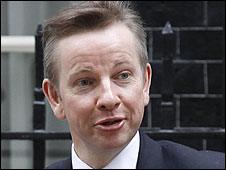Academy bids from 70% of top secondary schools - Gove
- Published

Education Secretary Michael Gove said Britain was falling behind some countries
Education Secretary Michael Gove says 70% of top secondary schools in England are interested in becoming academies.
In his first major speech since taking power, Mr Gove said he had been "overwhelmed" by the response to the offer of academy status.
Schools which become academies will opt out of local authority control and be directly funded by central government.
Answering his critics, he said the policy was driven by the aim of closing the gap between rich and poor.
The need to raise attainment for all children and close the achievement gap was the government's "guiding moral purpose," he said.
More than 1,772 schools had enquired about academy freedoms, he said.
These included 870 outstanding schools - 405 secondary schools and more than 400 outstanding primaries.
"Since I issued my invitation to schools three weeks ago, I have been overwhelmed by the response," he told the National College for Leadership of Schools, which trains heads and deputies.
"That's 70% of the outstanding secondary schools in the country and a significant cohort of outstanding primaries."
There are there roughly 700 secondary schools in England which have been rated outstanding by schools inspectors Ofsted.
Mr Gove addressed directly criticism of the academies scheme, which has included suggestions that it will fracture the schools system, set schools against each other and let down pupils in need.
"I know some have expressed concern that this offer of greater autonomy for schools will work against the collaborative model of school improvement that has grown up over the past 15 or so years and which has done so much to tackle under-performance in those schools in the most challenging circumstances," he said.
"I would not be going down this road if I thought it would in any way set back the process of school improvement, if it would in any way undermine the progress we need to make in our weakest or most challenged schools or if it would in any way fracture the culture of collaboration which has driven school improvement over the last decade."
Pupils in need
He said schools which took "academy freedoms" would continue to be governed by admissions rules which guaranteed fair access to all, safeguarded the inclusive character of comprehensive schools, ensured all schools took their fair share of pupils in need and prevented schools from discriminating against pupils with special educational needs.
In a wide-ranging speech, Mr Gove also warned that Britain was slipping behind the best in the world and said that the academies policy would give schools the autonomy they needed to drive up standards.
"Over the last three years I fear government action has held our education system back from making many of the advances we needed to make to keep pace with the best," he said.
"But we will now also provide you with the kind of autonomy that has served schools in America, Canada, Sweden and Finland so well and allow all schools the freedom to develop their own curriculum and fully control their own budget and staffing."
Mr Gove wrote to head teachers in every primary, secondary and special school in England last month inviting them to apply for academy status.